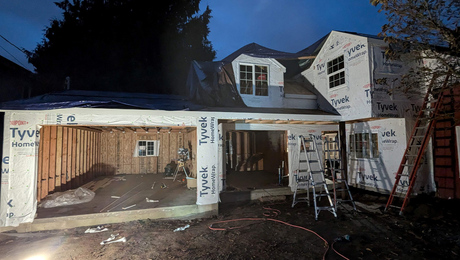Closing Down a House for the Winter
I have a ten year-old, well-insulated home in a rural area in New England and a small apartment in a big city. I’m considering completely shutting down the house this winter because of the cost of heating fuel and just stay in my apartment, reopening the house in April.
By having a plumber drain the pipes, and remove any liquids from the house which may freeze, would I be putting my house at any structural risks by completely shutting off the heat? Or, would it make more sense to drain the pipes and just run the furnace so that the interior temperature would remain at, say, 40 degrees.
Any recommendations?
DFM















Replies
Is frost action a significant reality where you are? If so, I am not sure I would want to risk my basements walls / slab floor cracking because of frost action. I have a home that we dont use much in the winter in Northern Ontario. I set the temp to about 40 and all has been good for the past 8 years. I would not leave mine unheated for the winter.
Thanks to all you who took time to reply. I appreciate it. To the points raised I offer the following replies:
Heat Source: Oil burner with a blown hot air heating system.
Frame, Walls & Floors: Post and beam construction; walls, which are not weight bearing, are a prefab sandwich of nailing surface, 6" of solid foam insulation, chip board, and sheetrock; Floors are all 100% wide plank white pine.
Heat Alarm: We have a temperature sensor which notifies the alarm company if the temperature in the house on the ground floor falls below 45F. There is a routine in place for the furnace company to get through the alarm system to tend to the furnace in an emergency (which raises the point that the driveway must be kept clear because we average 8' of show during the winter).
Potential Moisture Build-up: That's a great point.
Anti-Freeze for Drains: I'll be sure to use the right kind.
Foundation Frost Risk: The foundation is concrete and has no insulation.
The conclusion would seem to be that keeping the place at a low, but above freezing, temperature would be safe, but still drain the pipes and put anti-freeze in the drains and keep the temperature alarm as a back-up. I'll need to have someone clear the snow and it would be wise to have somebody come in each week to check the place.
Thanks to all.
DFM
You may have insurance issues if you let it freeze.
I agree that frost heave is a very real concern. I wouldn't risk it unless your house is in well drained, dry sand or gravel. It may be less of an issue if you have underslab foam and insulated foundation walls. And even if frost heave isn't the issue, the cold can be hard on a lot of things. Sheet vinyl floors shrink and can be ruined by cold. Drywall is also prone to cracks and nail pops because of movement. The wood structure will not be affected.
We have a lot of homes here that are used that way, and others where folks keep minimal heat turned on with water drained.
One issue is whether you have a boiler for heat source. Hydronic systems are normally filled with antifreeze nowdays, but still require makeup supply off the main water to keep pressure up.
In the houses with no heat at all, the main issue is condensation in the spring, when warm moist air comes along occasionally bu the wall surfaces are still extremely cold. I have seen water streaming down the wallpaper in march or april as though you had run a sprinkler in the house.
BUt with a modern tight shell like you describe, I assume that entry of exterior air and fast swings like that would not be so much of a problem. Occasionally there is an issue in newer ones with screws popping or a paint line at casing/wall or baseboard/wall openning up because of thermal expansion/contraction. If you are a perfectionist about that sort of thing. leave some heat on.
The other issue I can think of is the foundation. Sometimes houses are designed and detailed with normal heating in mind. Shallow frost protected monolithic slabs is one such.
Another unique item I saw was when somebody assumed that since they were shutting down, they could also kill the power. For "safety" they turned power off at the service panel, forgetting that they had a sump pump to keep the cellar dry.
In the spring, they had three feet of water down there. The furnace was ruined, along with everything stored in the cellar on pallets and hydrostatic pressure was lifting floors all over the first floor
Welcome to the
Taunton University of Knowledge FHB Campus at Breaktime.
where ...
Excellence is its own reward!
You can but a device which will call you if the temp goes below a certain point. Keep the place heated above that point and you will be alerted if it goes below the trigger temp. The cost of minimal heat has to be less than an unexpected major repair. Just in case, don't forget antifreeze in traps, toilets, toilet tanks, washing machine, dishwasher and floor drains...you'll sleep better. Install, or have a plumber install, a "one valve" drain for the whole place. Blow out pipes if they aren't pitched for drainage. When we built in the UP of Mich. we had all supplies pitched to drain to the drain valve near the pressure tank. Good Luck!
Make that clear you are talking about NON-TOXIC RV antifreeze.Not what is normally used in cars..
.
A-holes. Hey every group has to have one. And I have been elected to be the one. I should make that my tagline.
Woof!
Forrest
Bad dog Forrest!